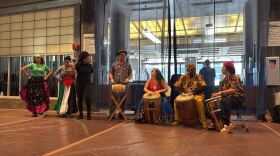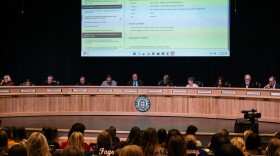Mideast leaders meeting in the U.S. capital agreed Thursday on a schedule for ongoing peace talks, aimed at resolving decades of deadly conflict in one year.
Former U.S. Sen. George Mitchell said Palestinian Authority President Mahmoud Abbas and Israeli Prime Minister Benjamin Netanyahu have agreed to hold a second round of talks on Sept. 14-15 in the Middle East, and then the two sides will meet every two weeks.
"Its purpose is to establish the fundamental compromises necessary to enable the parties to then flesh out and complete a comprehensive agreement that will end the conflict and establish a lasting peace," Mitchell said.
Mitchell, who is President Obama's top envoy to the two sides, says he and Secretary of State Hillary Clinton will take part in the continuing negotiations. So far, he said, there's been no decision on a location for the next meeting.
Clinton opened Thursday's talks at the State Department in Washington, D.C., saying the mere fact that Israelis and Palestinians have agreed to meet face to face is a cause for hope.
She told Abbas and Netanyahu that by being there they were taking "an important step toward freeing your peoples from the shackles of a history we cannot change and moving toward a future of peace and dignity that only you can create."
Both leaders began by stressing the difficulties that lie ahead. "True peace, a lasting peace, will be achieved only with mutual and painful concessions from both sides," Netanyahu said.
They also staked out key positions — Netanyahu insisting that the agreement must ensure security for Israel, and Abbas calling for an end to Israeli settlements in the West Bank.
The Palestinians are especially concerned about an Israeli moratorium on settlement-building that is scheduled to expire at the end of this month. Netanyahu had not said whether his government plans to extend the moratorium.
These were the first face-to-face negotiations between the two sides in 20 months, and U.S. officials sought to keep expectations modest. Netanyahu and Abbas also met on their own -- without U.S. mediators or their aides.
On Wednesday night, President Obama laid out the goal that his administration has said can be achieved in one year of serious talks: "a two-state solution that ends the conflict and ensures the rights and security of both Israelis and Palestinians."
Obama sought the backing of two neighboring countries for the talks. The working dinner at the White House included Jordan's King Abdullah II and Egyptian President Hosni Mubarak, as well as Clinton and Mitchell.
Sending A Message
Obama announced the opening of the talks Wednesday with a condemnation of fresh bloodshed in the West Bank.
Standing beside Netanyahu at the White House, Obama denounced the murders of four Israeli settlers in the Palestinian-controlled territory. The Palestinian militant group Hamas has claimed responsibility for the attack, which underlined some of the thorniest issues hindering a peace agreement.
Those issues include the ability of the Palestinian Authority to prevent such attacks, and the question of Israeli settlements in the West Bank.
After meeting privately with Netanyahu, the president spoke out against Tuesday's attack, saying the United States will push back against "these kinds of terrorist attacks," adding "so the message should go out to Hamas and everyone else who is taking credit for these heinous crimes that this is not going to stop us."
Netanyahu said the killings would not derail his talks with Abbas. The Israeli prime minister urged Israeli settlers to show restraint after the killings and not retaliate against Palestinians in the area.
For their part, Palestinian authorities rounded up some 250 people who they said were associated with Hamas in the West Bank. Hamas leaders based in Gaza said the attack was a message to Israel, designed to show that the militant group has the power to disrupt Israeli plans.
The Associated Press quoted an anonymous Hamas official as saying the attack was also designed to show that Palestinian leader Abbas "cannot protect the security of the Israelis and the settlers."
Security A Key Issue
The attackers killed two men and two women near the entrance to Kiryat Arba, a settlement that is a suburb of the West Bank city of Hebron. Officials say two of the victims were a couple who left a family of six children.
Because Netanyahu has said that Israeli security will be his main priority, the Palestinian Authority's ability to protect Israelis in the West Bank is key to the current negotiations.
The attack "shows the power of the few and determined to not only kill people, but to wreak havoc and undermine confidence in the peace talks," said Aaron David Miller, a Middle East scholar at the Woodrow Wilson Center.
"Netayahu is saying [to Abbas], 'I need you to control and silence all the guns in Palestine. This is a demonstration of the fact that Abbas can't do that," Miller said.
Copyright 2022 NPR. To see more, visit https://www.npr.org. 9(MDAzMjM2NDYzMDEyMzc1Njk5NjAxNzY3OQ001))






